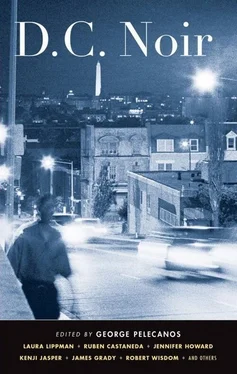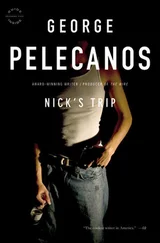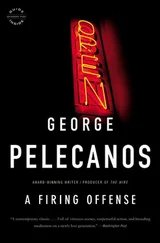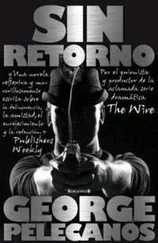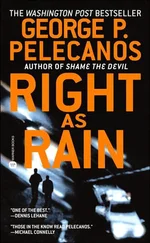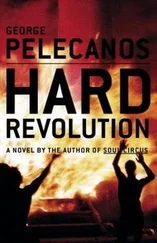It wasn’t a dream that woke me up that night. As I passed the doors to Dani and Jack’s rooms I heard the baby give out a creaking little sigh and settle himself back to sleep. I went down to the basement and got out Juanita’s first doll, the one she’d never see again. I held it in my hands and tried to get the head to stay straight, but it couldn’t. When something gets that broken, you can’t fix it.
I got a flathead screwdriver out of Dave’s toolbox. I turned the doll over and looked at the screws that held the doll’s battery compartment shut. They were almost stripped, but if I pressed hard enough into the metal groove I could catch just enough traction to get them turning. You had to want it bad, though, to get that job done. After I dug the last one out of its hole, I used the tip of the flathead to jimmy the cover off. It popped out more easily than I was expecting and the tip of the screwdriver slammed into what should have been a battery — but whatever it was gave under the point.
In the space where Baby’s batteries should have been — and crammed inside her torso and up into her poor dangling head — were plastic bags about the size of the half-sand-wich-sized Ziplocs I used to pack up snacks in to take to the playground. I didn’t need to know the name of what was in these.
I sat on the floor in the laundry room in my nightgown and stared at that doll and it stared back at me and its eyes weren’t crazy at all, not one bit. It knew the score. It knew that one of these nights I’d hear the noise of the Wheelchair Bandit’s keys and hear the panting breath of that pit bull and my family would never get clear, ever.
Unless.
I put every screw back in as tight as I could get it. I worked the flathead until my knuckles ached. A little bit of residue had settled into the gap where the doll’s head had separated from its neck; I blew every last speck of it out. Then I collected the doll and myself and found the back door key and let myself out onto the deck. I didn’t bother to get my slippers. I had to get that thing out of the house.
The lonely streetlight by the storage units shed an orange glow that just reached the spot where I’d found her. I could see the dark circle on the ground where Juanita had bled her life out with only an empty doll for company. I could see the gap in the bricks where Dani had found the thing I held in my hands.
I set that hateful thing back in the darkness where my daughter had found it and told myself I didn’t hear the jangle of keys, the dog panting right behind me. I told trouble I didn’t want any part of it. Nobody does, when you think hard about it. Isn’t that the truth?
Solomon’s alley
by Robert Andrews
Georgetown, N.W.
Solomon’s alley parallels M Street, Georgetown’s main drag. Running behind Johnny Rockets, Ben & Jerry’s, Old Glory Barbecue, and the Riggs Bank, the alley connects Wisconsin Avenue on the west to 31st Street one block east.
Battered blue dumpsters line the alley. Solomon had puzzled over the dumpsters for several years. Finally, he’d decided that their BFI logo stood for big fucking incinerators. That job done, he’d taken on thinking out the likely origins of the five ancient magnolia trees that shaded the stretch of alley where he parked his two Safeway carts.
On this Tuesday morning in September, he sat in his folding canvas deck chair, part of him pondering the magnolias while another part got ready for his day job, watching the Nigerian. At 10:00, like clockwork, the white Dodge van pulled up across Wisconsin at the corner of Prospect, by Restoration Hardware.
“Hello, Nigerian,” Solomon whispered. He settled back to watch the sidewalk come alive. Each morning’s setup was a ballet, a precisely choreographed routine, and Solomon was a discriminating critic.
Most mornings the performance went well: every move efficient, rhythmic, smooth. Some mornings it didn’t: some mornings everything fell apart in a cranky series of busted plays.
The driver eased the van forward so its front bumper toed the white marks on the pavement. He switched off the ignition and got out to go round to the back.
Waverly Ngame was a big man. Two-fifty, six feet and a couple of inches, Solomon figured. His skin blue-black… shin… like the barrel of a .38.
First out, a long rectangular folding table, the kind you see in church basements. Ngame locked the legs open. With his toe and wood shims, he worked around the table until it rested solid on the uneven brick sidewalk.
He disappeared into the van and came out with racks of white plastic-coated wire-grid shelving under both arms and a grease-stained canvas bag in his left hand.
In swift, practiced motions, he picked the largest of the shelves and braced it upright on the side of the table facing the street. With one hand he held the shelf, with the other he reached into the canvas bag and came out with a large C-clamp. Twirling it with sharp snaps of his wrist, he opened the jaws just enough to slip over the shelf and the table edge. He tightened the clamp, and moved to repeat the process on the other side of the table.
More shelving and more C-clamps produced a display stand.
Now the van disgorged Ngame’s merchandise in large nylon bags and sturdy blue plastic storage boxes. Soon, Gucci and Kate Spade handbags hung alluringly from the vertical shelving while Rolex watches and Serengeti sunglasses marched in neat ranks across the top of the church-basement folding table.
He slow today , said Voice.
“He did good,” Solomon contradicted. He didn’t want to give Voice shit. He did that, give Voice any slack, Voice start up. Voice need his pills? Solomon tried to remember the last time he trucked to the clinic, then gave it up. Long as it was only one Voice, he could handle it. It only got bad when he had to put up with the whole goddamn family yelling and screaming, scrambling things inside his head.
Ngame climbed into his van. That was Solomon’s cue. He got out of his chair and walked to where the alley ran into Wisconsin. There, he could keep a closer eye on Ngame’s stand.
Ngame eased the van across Wisconsin and into the alley, waving to Solomon as he passed by. He pulled the van into a slot by the florist shop on 31st Street where he had a deal with the manager. Locking the van, he walked back up the alley toward Solomon.
“Nobody bother the stand, Waverly.”
Ngame palmed Solomon a folded five.
“A good day, Solomon.”
As a boy in Lagos, Ngame had learned his English listening to BBC. He sounded like a Brit announcer except that he had a Nigerian’s way of softly rounding his vowels and stressing the final syllables of his sentences.
Solomon shook his head. “Watch yourself today.”
Ngame gripped Solomon’s shoulder.
“Voice tell you that?” he asked. He searched Solomon’s face with clinical curiosity.
Ngame’s concern irritated Solomon. “Hunh! Voice don’t know shit,” he said crossly. “Solomon telling you.”
Something passed behind Ngame’s eyes. He looked serious. “You hear anything?”
“Just feel,” Solomon whispered to keep Voice from hearing, “just feel.”
Ngame smiled. “You are a belt-and-suspenders man, Solomon.”
Solomon pouted and tucked the five away. “You don’t have belt and suspenders, Waverly, you lose your ass.”
Ngame took that in with a laugh. He squeezed Solomon’s shoulder, then turned and made his way across Wisconsin.
In the street by Ngame’s stand, a crow worried at the flattened remains of a road-killed rat.
And down the block from the stand, Solomon saw two men get out of a maroon Crown Vic. One black, one white. Both big. Both cops.
With a little finger, Ngame made a microscopic adjustment, poking a pair of sunglasses to line them up just so with its neighbors. He didn’t look up from putting fine touches to his display.
Читать дальше
